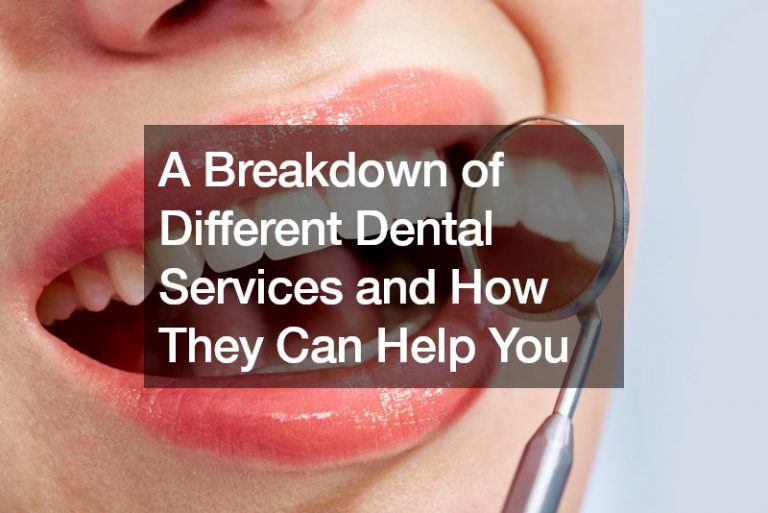The Purpose of a Dentist and What to Know
A visit to the dentist is a routine, yet crucial part of maintaining one’s overall health. The purpose of a dentist is multifaceted, encompassing a wide range of procedures and services designed to keep your teeth, gums, and mouth in optimal condition. From routine dental cleanings to complex dental implant procedures, dentists serve as essential guardians of oral health. They provide guidance on maintaining hygiene, identify and treat various dental issues, and perform surgeries that can have a significant impact on a person’s quality of life. This comprehensive guide delves into the many roles that dentists play, the variety of services they offer, and the specific procedures they perform. Whether you need an affordable dental implant, cosmetic dental service, or need help with broken teeth repair, understanding the purpose of a dentist will help you make informed decisions about your dental care.
Oral health is often an overlooked aspect of one’s overall wellbeing, yet it plays a critical role in everyday life. Issues such as tooth decay, gum disease, and misaligned teeth can cause severe discomfort, affect one’s appearance, and lead to other health problems if not treated promptly. Dentists are equipped with the knowledge and skills to address these problems effectively. They use state-of-the-art technology and up-to-date techniques to provide treatments that not only alleviate pain and discomfort but also enhance the function and aesthetics of one’s smile. By understanding the array of services available, you can better appreciate the invaluable role dentists play in maintaining your health and quality of life.
Affordable Dental Implant
One of the critical services offered by dentists is the provision of affordable dental implants. Dental implants are titanium posts surgically placed into the jawbone to serve as artificial roots for replacement teeth. They provide a sturdy foundation for fixed or removable replacement teeth designed to match your natural teeth. Affordable dental implants are particularly beneficial for individuals who have lost teeth due to injury, decay, or disease.
The procedure of getting an affordable dental implant typically involves multiple steps, including a thorough dental exam, surgical implantation, and placement of the artificial tooth. The purpose of a dentist during this process is to ensure the patient’s comfort, monitor progress, and address any complications that may arise. By offering affordable options, dentists make this life-changing procedure accessible to a wider range of individuals, improving their ability to eat, speak, and smile confidently.
Dentists play a crucial role in the success of dental implants by providing personalized care and follow-up services. They are responsible for advising patients on post-operative care, ensuring proper healing, and conducting regular check-ups to monitor the condition of the implants. Affordable dental implants can significantly improve a patient’s quality of life, highlighting the purpose of a dentist in making advanced dental treatments available to everyone.

Dentists
Dentists are highly trained healthcare professionals dedicated to diagnosing, treating, and preventing oral diseases and conditions. They undergo extensive education and training to gain the skills necessary to perform a wide range of tasks from routine cleanings to complex surgeries. The purpose of a dentist goes beyond just treating dental issues; they also play a vital role in educating patients about oral health and preventative care.
Dentists work in various settings, including private practices, hospitals, and community health centers. They often collaborate with dental hygienists, dental assistants, and other professionals to offer comprehensive care. The purpose of a dentist, therefore, extends to being part of a multidisciplinary team focused on the overall well-being of their patients.
By staying updated with the latest advancements in dental technology and treatments, dentists are equipped to provide the best care possible. Whether performing routine check-ups, filling cavities, or conducting oral surgeries, the primary purpose of a dentist is to ensure their patients maintain healthy teeth and gums for life. This commitment underscores the importance of regular dental visits and ongoing care.
Dental Cleaning
Dental cleaning is one of the most common and essential services provided by dentists. This procedure involves the removal of plaque, tartar, and stains from the teeth to prevent cavities, gum disease, and other oral health issues. The purpose of a dentist during a dental cleaning is to maintain the patient’s oral hygiene and detect any early signs of dental problems.
Regular dental cleanings are vital because they help to prevent the build-up of harmful bacteria and plaque that can lead to serious dental issues. During a cleaning, dentists also examine the patient’s mouth for any signs of oral cancer, cavities, and other health conditions. The purpose of a dentist in this context is not just to clean the teeth but to provide a comprehensive assessment of the patient’s overall oral health.
Dentists often educate patients about proper brushing and flossing techniques during dental cleanings. They provide personalized advice on maintaining oral hygiene at home, which is crucial for preventing dental problems between visits. Through these preventative measures, dentists fulfill their purpose of promoting long-term oral health and preventing more severe issues from developing.

Dental Implant Procedures
Dental implant procedures are a remarkable advancement in modern dentistry, offering a long-term solution for tooth loss. The process typically involves several stages, starting with a comprehensive evaluation by the dentist to determine the suitability of the patient for implants. The purpose of a dentist during this evaluation is to assess the patient’s oral health, bone structure, and overall medical condition.
The next step in dental implant procedures is the surgical placement of the titanium post into the jawbone. This requires precision and expertise to ensure that the implant is securely anchored and positioned correctly. The purpose of a dentist in this phase is to carry out the surgery with utmost care, minimizing discomfort and ensuring optimal healing.
After the surgical placement, there is a healing period during which the bone grows around the implant, securing it in place. Once the healing is complete, a crown is attached to the implant, creating a durable and natural-looking replacement tooth. Throughout this process, the purpose of a dentist is to monitor the patient’s progress, address any complications, and ensure the success of the implant.
Clear Aligner
Clear aligners are a popular alternative to traditional braces for correcting misaligned teeth. These custom-made, virtually invisible trays gradually shift teeth into their desired position without the need for metal brackets or wires. The purpose of a dentist in providing clear aligner treatment is to offer a comfortable and discreet solution for orthodontic issues.
The treatment process begins with a thorough examination and digital imaging to create a precise 3D model of the patient’s teeth. This model is used to design a series of aligners that will be worn over a specific period. The purpose of a dentist during this phase is to ensure that the aligners fit correctly and are effective in moving the teeth as planned.
Patients typically visit their dentist every few weeks to monitor progress and receive new sets of aligners. The purpose of a dentist in these follow-up visits is to make any necessary adjustments and ensure that the treatment is proceeding as expected. Clear aligners provide an excellent option for those seeking to improve their smile without the visibility and discomfort of traditional braces.

Cosmetic Dental Service
Cosmetic dental services aim to enhance the appearance of a person’s smile through various procedures like teeth whitening, veneers, and bonding. The purpose of a dentist in cosmetic dentistry is to help patients achieve their aesthetic goals while ensuring the health and function of their teeth. These services can significantly boost a person’s confidence and overall self-esteem.
Teeth whitening is one of the most sought-after cosmetic dental services, providing a quick and effective way to remove stains and discoloration. The purpose of a dentist in this procedure is to use professional-grade products and techniques to achieve a brighter, more youthful smile. Veneers, another popular option, involve placing thin shells of porcelain or composite resin over the teeth to improve their shape, size, and color.
Bonding is a procedure where a tooth-colored resin is applied to the teeth and hardened with a special light, repairing chips, cracks, or gaps. The purpose of a dentist in performing bonding is to restore the natural appearance and functionality of the teeth. These cosmetic services highlight the role of the dentist in both the aesthetic and health aspects of dental care.
Broken Teeth Repair
Accidents, injuries, or simply biting on something hard can result in broken teeth, which require immediate repair to prevent further damage. The purpose of a dentist in broken teeth repair is to restore the tooth’s structure, function, and appearance. Various techniques are used depending on the extent of the damage.
For minor chips or cracks, dental bonding or veneers may be sufficient to repair the damage. This involves applying a tooth-colored resin or a custom-made shell to the affected area. The purpose of a dentist in these procedures is to ensure the repaired tooth blends seamlessly with the rest of the teeth, providing a natural look and feel.
In cases where the tooth is more severely damaged, treatments like dental crowns or root canal therapy may be necessary. A crown is a cap placed over the damaged tooth to restore its shape, strength, and function. Through these comprehensive repair techniques, the purpose of a dentist is to save the damaged tooth, prevent infection, and maintain the patient’s oral health.

Dental Bridge
A dental bridge is a fixed appliance used to replace one or more missing teeth by joining an artificial tooth to adjacent teeth or dental implants. The purpose of a dentist in placing a dental bridge is to restore the patient’s ability to chew, speak, and maintain the shape of their face. This procedure also helps prevent the remaining teeth from shifting out of position.
The placement of a dental bridge typically involves preparing the adjacent teeth, called abutments, by removing a portion of their enamel to accommodate the bridge. The purpose of a dentist during this preparation phase is to ensure that the abutments can support the bridge securely. After preparing the teeth, the dentist takes an impression, which is used to create a custom bridge that fits precisely.
Once the bridge is fabricated, the dentist will fit it and make any necessary adjustments before permanently cementing it in place. The purpose of a dentist in this final stage is to ensure the bridge feels comfortable and functions naturally. Dental bridges are a highly effective solution for missing teeth, underscoring the dentist’s role in restoring both the function and appearance of the patient’s smile.
Family Dentists
Family dentists provide comprehensive dental care for patients of all ages, making them an ideal choice for households seeking a single dental care provider. The purpose of a family dentist is to offer a wide range of services that cater to the unique needs of children, adults, and seniors. This includes preventative care, restorative treatments, and educational support to promote lifelong oral health.
One of the primary advantages of seeing a family dentist is the convenience of coordinating care for multiple family members across different age groups. The purpose of a family dentist in this context is to develop long-term relationships with patients, understanding their dental history and providing personalized care. Routine visits can help catch potential issues early and provide timely interventions.
Family dentists are skilled in handling the specific needs of young children, such as monitoring the development of their teeth and educating them on proper oral hygiene practices. They are also equipped to manage age-related dental issues in adults and seniors, such as gum disease and tooth loss. Through comprehensive and continuous care, the purpose of a family dentist is to support the oral health of the entire family.

Braces
Braces are a traditional and effective method for correcting misaligned teeth and jaw issues. Comprising metal brackets and wires, braces gradually move teeth into their desired positions over a period of months or years. The purpose of a dentist in providing braces is to improve the patient’s bite, dental health, and overall aesthetics.
The process of getting braces begins with a thorough examination and assessment of the patient’s dental structure. The purpose of a dentist during this phase is to determine the most suitable treatment plan, which may include other orthodontic appliances in conjunction with braces. Once the braces are applied, the patient must visit the dentist regularly for adjustments.
Throughout the treatment period, the purpose of a dentist is to monitor progress, make necessary modifications, and ensure the patient maintains good oral hygiene. Braces can correct a wide range of dental issues, including overcrowding, gaps, and bite problems, highlighting the vital role of the dentist in transforming the patient’s smile and enhancing their oral health.
Dentistry encompasses a vast array of services and procedures all aimed at maintaining and improving oral health. The purpose of a dentist is multifaceted, extending beyond just treating dental issues to include prevention, education, and comprehensive care. Whether it’s providing affordable dental implants, performing routine dental cleanings, or offering cosmetic dental services, dentists play an essential role in the overall well-being of their patients.
Understanding the different aspects of dental care can empower patients to make informed decisions about their oral health. Regular visits to the dentist are crucial for early detection and management of potential dental issues. By maintaining a partnership with a trusted dentist, patients can prevent severe problems, receive timely treatments, and enjoy the benefits of a healthy, beautiful smile.
Advances in dental technology and treatments have made it possible to address a wide range of dental issues more effectively and comfortably than ever before. From clear aligners to dental implant procedures, the modern dentist is equipped with the tools and knowledge to provide high-quality care. By understanding the purpose of a dentist and the services they offer, patients can take proactive steps towards achieving and maintaining optimal oral health.






